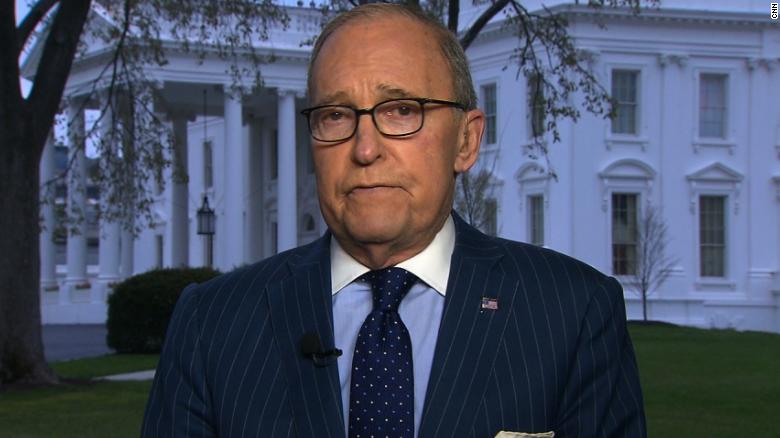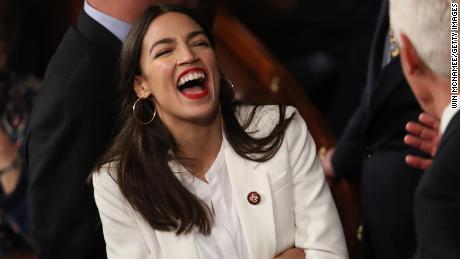(CNN)So much ink has been spilled for so long on the national debt, it might be nice if that $22 trillion plus on the red side of the US balance sheet just didn't really matter.
That's exactly the thinking behind a new school of economic theory that the government should be spending more, not less.
The status quo is that Republicans promised strong growth kickstarted by the tax cuts they passed without Democratic help would help "pay for" the tax cuts themselves. That's a question mark in any case, but it will only really work with so-called entitlement reform to curb the growth in spending of Medicare and Social Security. They passed the tax cuts -- the easy part -- without addressing the spending, the hard part.
The end result is that the US deficit -- the amount of money the US government takes in from taxes and other things subtracted from the amount it spends -- is projected to be more than a trillion dollars this year.
In total, it'll be $22 trillion any day now and it's going to get a lot bigger. Cue the annual-ish political fight over raising the US debt limit -- the top amount the government is allowed under law to borrow.
By the way, lawmakers don't even raise the debt limit any more. Recently, they've just suspended the idea of a debt limit for a year. Democrats indicated this year they want to create an automatic mechanism to raise the debt ceiling, but Republicans aren't sold on the idea.
Growing debt has caused more than its share of distress among politicians who warn about the dangers of the US essentially being in hock to its creditors.
But no amount of warning has stopped each successive recent president from finding a way to add their own spending projects, but never enough belt-tightening to offset new spending. The last time the US didn't spend more than it took in was in 2001.
George W. Bush spent big on the war on terrorism and also his prescription drug addition to Medicare. Barack Obama spent big on stimulus during the Great Recession and on Obamacare. And Donald Trump spent on his tax cuts.
When Democrats took power in Congress, a new wave of of lawmakers wanted to scrap nonbinding so-called "paygo" -- pay as you go -- rules so that they could introduce and vote for new government programs to give free education and better health care and deal with climate change without having to pay for them by either raising taxes or cutting spending elsewhere in the budget.
Democratic elders prevailed, for now, on that front, but it's clear that more progressive Democrats who helped land their party the majority and who are more in line with the Bernie Sanders wing of the party than the Hillary Clinton one have big plans for the government to help people and no desire to balance the budget.
Alexandria Ocasio-Cortez, the poster child for the new Democrats, has spoken freely about her desire to impose a marginal tax rate upward of 70% on the wealthiest Americans. That sounds politically crazy after Republicans just lowered taxes on the wealthiest Americans. But it's not exactly unprecedented -- similar rates were in place under Republican and Democratic administrations in the '50s and '60s. Nor is it out of step with what a lot of economists have been saying, according to an approving column by New York Times columnist Paul Krugman.
Ocasio-Cortez and other progressives like Sanders aren't afraid to talk about spending trillions on new programs without cutting other programs, debt be damned.
"You can pay for it by saving costs on expenditures that we're already doing," Ocasio-Cortez recently told Business Insider. "We can do it by saving money on military spending. We can pay for it by raising taxes on the very rich. We can pay for it with a transaction tax. We can pay for it with deficit spending."
The school of thought that allows such dreams -- Modern Monetary Theory -- suggests seriously that if a government that controls a currency needs more money, it just prints more. It can't go bankrupt if it's printing its own money. Just print more, essentially.
The idea is that the deficit actually equals wealth in the private sector and that's a good thing. What are the treasuries securing that debt if not the promise of newly printed money? And as long as there's a market for them, they should be used by the government to improve society.
If that sounds a bit socialist, it is, but so are the self-described democratic socialists like Sanders and Ocasio-Cortez.
The liberal Krugman, for the record, while approving of the higher taxes, has been less friendly to MMT, as its known.
"While it may literally be true that a government with its own currency can't go bankrupt, it can destroy that currency if it loses fiscal credibility," he wrote back in 2011.
But people like Stephanie Kelton, Sanders' economist in 2016, a professor at Stony Brook University, and a proselytizer for this view toward currencies and national economies, argues that the government essentially prints money each time it authorizes new unpaid for programs and that it hasn't hurt the economy by causing runaway inflation.
We asked her for her her thoughts on the national debt as it approaches $22 trillion. That exchange is below:
CNN: We've spent years and years in US politics worrying about the national debt, which is going to hit $22 trillion any day. $22 trillion sounds like so much money and the rate at which the debt has been increasing seems to be speeding up. Why is this not such a big deal?
Kelton: Few people understand what the national debt is, and most people tend to conflate government deficits with the national debt. So let's start by clarifying these terms. The national debt is nothing more than a historical record of all the dollars that were spent by government but not taxed back. When the government spends more than it collects in the form of taxes (and other payments), we label it "deficit spending." But that's only part of the story. To complete the picture, suppose the government spends $100 into the economy but only taxes $90 back out. The result is a surplus equal to $10 that shows up somewhere in the non-government part of the economy. In other words, the government's "red ink" becomes our "black ink." Their deficits are our financial surpluses. So where does the "debt" come into play? Whenever the government runs a deficit, it sells government bonds called U.S. Treasuries. This is usually referred to as "borrowing," but that's actually misleading. What's really happening is that the government is allowing people to trade in their dollars for a bond that pays some interest. A pretty good deal if you happen to be lucky enough to hold some of that $22 trillion.
CNN: What size annual deficit would worry you and why?
Kelton: Inflation is the relevant risk, not the size of the annual deficit. In the aftermath of the 2008 financial crisis, budget deficits rose to more than 10 percent of GDP. They were big, by historic standards, but they were nothing to worry about. In fact, most economists seem to agree that bigger (and better targeted) deficits would have helped the economy recover much more quickly. Today, the government is running annual budget deficits that are expected to reach $1 trillion. That's a lot of zeros, but so what? Remember, their red ink is our black ink. What worries me about the deficits we're running today is not their size but their nature. A big part of the reason the government is running bigger deficits right now is because Republicans voted for tax cuts that overwhelmingly benefit the richest Americans and large corporations. Income and wealth inequalityŌĆöalready at alarming levelsŌĆöwill only widen. So I worry about the way these deficits are being used to funnel resources to the people who least need the help.
CNN: If Republicans can slash tax rates and Democrats should pass massive benefits programs like Medicare for All and free college without regard to debt, what's the brake? What keeps politicians in check with what they can promise to voters. Or should there be a brake?
Kelton: The brake is inflation. If policymakers run wild, cutting taxes and pumping money into the economy with reckless abandon, inflation will spike and voters will (presumably) check those politicians at the ballot box. So, in a sense, democracy is the thing that keeps politicians in check. But that doesn't mean we can't pass Medicare-for-All or make public colleges and universities tuition-free, even with the tax cuts in place. The debt is not the constraining factor (except, perhaps, politically). The point is this: the economic constraint is inflation.
CNN: Part of what you argue is that if inflation gets out of hand, that's a good time for Congress to raise taxes. But the political momentum is in the opposite direction, as we saw last year with the tax cuts. What's your thinking on where political reality runs into economic theory?
Kelton: I believe the government should use the federal budgeting process to maintain a balanced economy. That means balancing the risks of inflation against the benefits of full employment. It means embarking on new spending programs only if those programs can be implemented without causing excessive inflation. It might be necessary to raise taxes in order to prevent, say, a massive infrastructure program from pushing the economy beyond its limit. But taxes aren't the only way to curb inflation. The most important thing is to understand what's actually driving the inflation. Historically, the big drivers of inflation have been: energy, housing, and health care. So even if the political reality means you can't raise taxes, you can still fight inflation with policies that increase the supply of available housing units, promote energy efficiency, and lower health care costs. I also wouldn't discount the possibility that our political realities might evolve rather quickly with an MMT-informed Congress.
CNN: Is MMT a socialist idea or is it a free market idea? Explain.
Kelton: Neither. MMT is mostly a descriptive project. It provides a lens that can be used to understand how a modern, capitalist economy works. Based on that understanding, MMT also offers a prescriptive side, which shows how fiscal/monetary/regulatory policies can be used to constrain inflation while maintaining full employment.
CNN: If the national debt shouldn't scare Americans, what should?
Kelton: The national debt is nothing to fear. What should scare Americans is allowing misunderstandings and fear-mongering about the national debt to prevent us from taking bold action to deal with the urgent threat of climate change.








